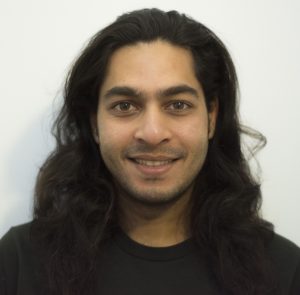 Sultan Barodawala
Sultan Barodawala
You Visit
Panel:
9:30 am to 10:30 am
Subjective/Objective: Versions of Reality
360 surround cinema and news, entertainment and advertising
About:
Sultan (MFA) is an artist who works with memory and technology to create immersive experiences. Sultan has previously worked with MTV, Red Bull and Underwater Film Services and has won awards at the Adobe Achievements Design Awards and the Wildlife Conservation Film Festival. He currently works with YouVisit Studios crafting narrative experiences through virtual reality.
Reflective Essay:
Is VR (and other immersive technologies) something that will enable us to experience unknown realities deeper and foster our sense of empathy and understanding of others — or, push us to retreat further into subjective personal spaces (like with social media now) and detach even more from reality and real-life communities.
Virtual Reality has the power to transport us immediately anywhere on earth, allowing us to experience and be a part of someone else’s narrative and actually believe it. That’s powerful. Virtual Reality also gives us a God-like power to create new worlds, rendered mindspaces where you literally inhabit another world. Humans can finally construct their dreams and thoughts and invite others to come experience them. Imagine a world with no physical borders, no limitations, no racial differences; you can be whoever you want, not someone you were told to become. Terence Mckenna says, “Our destiny is to become what we think, to have our thoughts become our body and our bodies become our thoughts.” Imagine connecting with someone’s thoughts. Think of the intimacy.
Social Media lacks intimacy. Yes, we will still all wear masks but VR will pose its own benefits and problems. When I see or talk to someone on social media, the interaction is very different from real life. I don’t have to respond immediately, and I can really think about and edit what I want to say. That’s not how real conversations work at all. Real conversations (sans phones) are intimate, your reaction time is important, what you say, along with your body language, allows others to interpret you in a more truthful way. And because you’re there, you are conscious of yourself. Virtual Reality requires commitment. Just like the real world, you’re completely immersed in a virtual world, and in most cases it’s like you’re interacting with real people in a masquerade party. In many ways it’s reality made better. In the world we live in, when someone takes out their phone, it automatically encapsulates them in this isolation bubble that keeps the possibility of real conversation at bay. I believe VR will burst that bubble.
As VR technology evolves, it will pose many new benefits, but also plenty of problems. Screens will become extinct very soon. Our virtual information will become integrated with our natural physical environments. This information will feel more tactile and real. Information itself will become more intimate. And with Augmented reality we’ll be able to access information very quickly, and multitask much faster while still being a part of the real world. However, we will give the real world less importance. With mixed reality our physical world will be enhanced by either becoming as beautiful as the aurora borealis or be a hundred times more cluttered than Times Square. Unfortunately I predict it will be more of the latter.
A couple of months ago I was using a social VR app called vTime to talk to my mother in India. Two things happened that night. First, I got pulled into a wrong group chat by accident (my fault). I was transported inside a moving train’s compartment. I was immediately greeted and introduced to three avatars. Even though my mother was waiting for me in another chat environment, I just couldn’t get myself to hit the ‘exit group’ button and leave the chat. I feared being rude (In comparison, leaving is easy while chatting via Facebook.) I explained myself to my fellow avatars and excused myself from the train, like I would do at a dinner table!
I then met my mother at a virtual campsite. It was nighttime and we sat around a bonfire. She was a 90’s animated version of herself. I had orange hair. While I was talking to her, she suddenly screamed! A black and yellow virtual snake had slithered by under her. I laughed immediately. I then laid down on my physical bed (in Brooklyn) and looked up at the virtual stars while my mother filled me in on her stories of the real world. Can you imagine having an experience like this with someone on a phone?
Virtual Reality can get very addictive, I’ve painted in Google’s Tilt Brush for 2 hours straight. I predict people will be spending a lot more time in the virtual world, interacting with people, information, places, games and shops in a whole new and intimate way. And it does come at a cost: we will spend less time in the real world and more time exploring enhanced virtual ones. Some people may argue this, saying that choosing to immerse oneself in VR is completely subjective and will depend on the individual user. But I believe that we as a society will be swayed towards the virtual, because the human desire to escape is deeply embedded in us and the virtual world offers limitless possibilities. Instead of pushing us to retreat further into subjective personal spaces and detach even more from reality, these immersive technologies will enable us to experience new and unknown realities deeper, and foster our sense of empathy and understanding of others.
However, technology — like fire — can be used to keep us warm on a freezing night or be used to burn whole cities to the ground. I believe VR will truly bring out who we really are and that’s what I’m personally most excited and afraid of.